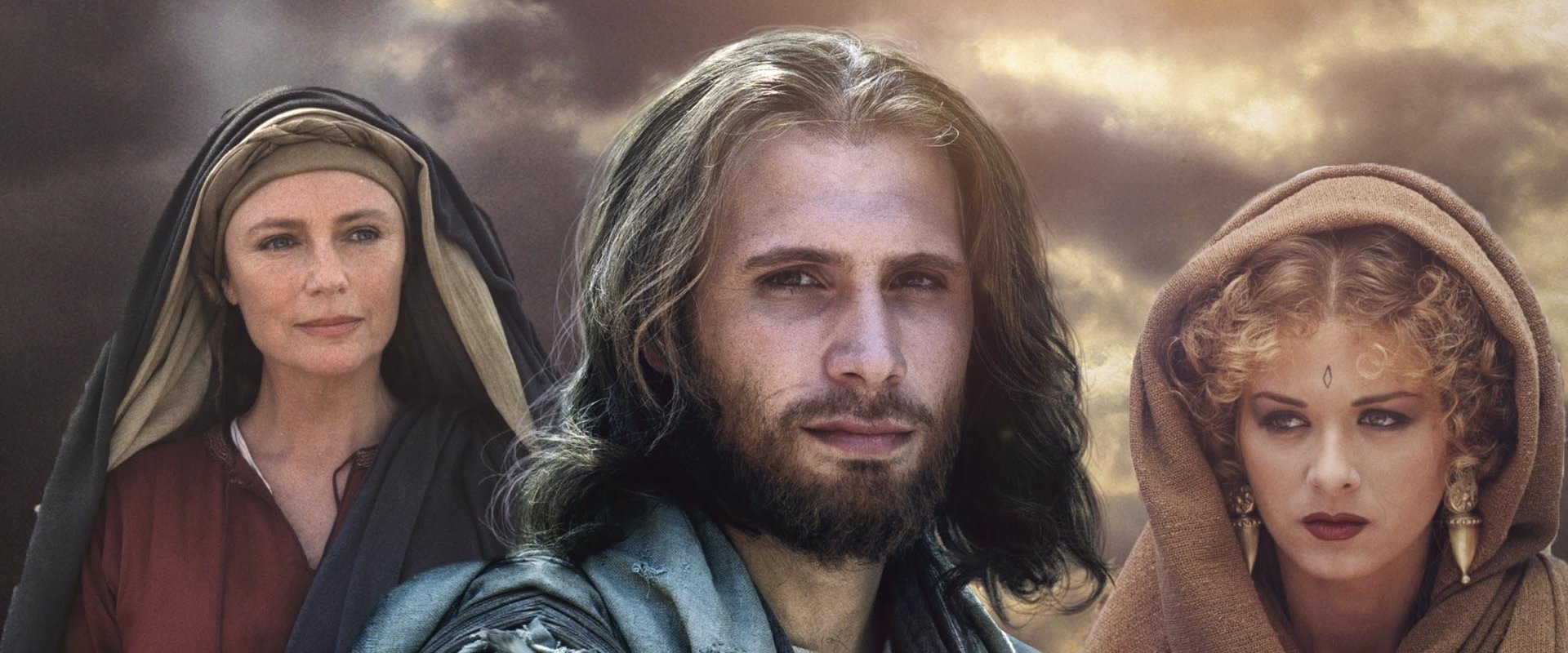Jesus
Jesus dreams of a medieval battle in the name of Jesus Christ and of a dying world war soldier who, in desperation, calls out the name: Jesus. Jesus awakes, distraught. What is the meaning of this nightmare? Why are these strangers using his name? Jesus is a simple carpenter, like his father Joseph. Both are presently looking for work, but they've been wandering for days from town to town without finding any. Times are difficult in Galilee. Roman taxes are stifling the country. The hated Jewish tax collectors, viewed by the people as traitors, rob people of their last means of subsistence. Revolts and bands of revolutionary thieves are spreading uncertainty throughout the land. Herod Antipas, the Jewish king, is merely a weak shadow of his feared father Herod the Great. The real power lies in the hands of Caiphas, the high priest. To strengthen his position, he plays the Jewish interests against the Roman interests with religious fervor. His most dangerous opponent is the new Roman procurator, Pontius Pilate. This hard, people despising military man has an ideal comrade in arms in the cynical author and spy Livius. The two callously attempt to keep rebellious Judea under Roman control. Countless crosses with executed rebels line the streets. The Romans, however, observe the growing power of itinerant preachers and prophets with suspicion. The most influential of these prophets is John the Baptist. He fearlessly condemns Roman lust for power, the decay of religious customs and the reprehensible immorality in the house of Herod. After Joseph's death, Jesus feels abandoned and lonely. He believes that he is not yet strong enough to take up his calling. Then his mother Mary tells him how an angel once revealed to her that she would bear a son, and she tells how determinedly Joseph declared his support for this miraculous child, despite the fact that it was not his own. Further, Mary describes the foreign kings who paid homage to the newborn child. Jesus now realizes that it is time for him to follow his calling. He takes his leave from his previous life and from Mary of Bethany, the woman who loves him. From now on, his life is to be completely devoted to his great mission. Jesus visits John the Baptist. In their childhood days, Joseph raised these two as brothers. They remember their first shared visit to the temple, as well as the fact that, back then, it was Jesus who, as a 12 year old boy, went to the temple without his parents' knowledge, in order to teach in his father's house. Now that Jesus is ready to take up his calling, John agrees to baptize him. At the baptism, a glowing dove appears and a voice calls Jesus by name. After the baptism, Jesus retreats to the desert, alone, to meditate. There, Satan appears to him in the form of a beautiful, beguiling woman and a man in contemporary street clothes. Satan shows Jesus all the unhappiness that his teachings will one day bring to humanity and offers him in exchange real, unlimited power over the Earth. Jesus resists the temptation and, now steadfast, returns home. The first disciples are already slowly beginning to gather around Jesus. They still have doubts, however, as to whether their master is really the heralded Messiah. Only Mary trusts in her son. When the wine runs out at her nephew Benjamin's wedding, she is able to talk Jesus into giving everyone a visible sign of his divine heritage. Jesus asks to have the amphora filled with water and transforms it into wine. This miracle allays his disciples' doubts. Through miracles, Jesus succeeds in allaying the doubts of Simon the Fisher and even those of Thomas, the skeptic. They, too, follow him. At the same time, however, Jesus continually perplexes his followers with his incomprehensible behavior. He shuns the Jewish freedom movement lead by the wild Zealot leader Barnabas, for example, and instead accepts the invitation of Matthew the tax collector. Matthew, too, becomes a follower of Jesus, despite the other disciples' mistrust. When a recently discovered adulteress is to be stoned by an angry mob, Caiphas sees his chance expose to Jesus. He invites the crowd to demand a verdict from Jesus. Jesus, however saves the desperate young woman by declaring that only he who is without sin himself may cast the first stone at her. Ashamed, the mob disperses. Deeply moved by this scene, the former prostitute Mary Magdalene joins the disciples. When Jesus wants to go with his students to the temple to pray, he finds the temple court full of traders and money changers. Suddenly overcome with rage, Jesus hurls their stands to the ground and, wielding a whip, drives the profiteers out of the temple. When neither the Jews nor the Romans show signs of resistance, it becomes clear that Jesus will play an important role in Judea's future religious and political development. John the Baptist, in the meantime, has been executed at the wish of Queen Herodias, the wife of Herod Antipas. Jesus mourns his loss greatly, but he can hardly give in to his pain, as more and more people are coming to him to hear his teachings, even though many of










